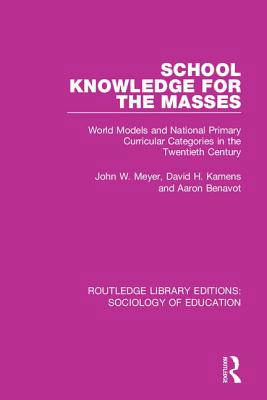
- Retrait gratuit dans votre magasin Club
- 7.000.000 titres dans notre catalogue
- Payer en toute sécurité
- Toujours un magasin près de chez vous
- Retrait gratuit dans votre magasin Club
- 7.000.0000 titres dans notre catalogue
- Payer en toute sécurité
- Toujours un magasin près de chez vous
School Knowledge for the Masses
World Models and National Primary Curricular Categories in the Twentieth Century
John Meyer, David Kamens, Aaron BenavotDescription
First published in 1992, this book presents unique quantitative data on the content coverage of primary education in a large number of countries since 1920. It demonstrates that these curricular outlines tend to be surprisingly similar across very disparate countries, and suggests the world processes that produced this result.
Specifically, the study shows that the contemporary primary curriculum dates from changes in the late nineteenth century; that there has been a general shift towards a 'social studies' subject; that instruction in mathematics and sciences has tended to expand; that there have been substantial increases in foreign language instruction (and changes in the languages taught); and that instruction in the arts and physical education come to the standard world education model much later than other subjects.
This work will be of particular interest to those studying primary curriculum, international education and the sociology of education.
Spécifications
Parties prenantes
- Auteur(s) :
- Editeur:
Contenu
- Nombre de pages :
- 212
- Langue:
- Anglais
- Collection :
- Tome:
- n° 36
Caractéristiques
- EAN:
- 9780415788557
- Date de parution :
- 28-04-17
- Format:
- Livre relié
- Format numérique:
- Genaaid
- Dimensions :
- 156 mm x 233 mm
- Poids :
- 569 g

Les avis
Nous publions uniquement les avis qui respectent les conditions requises. Consultez nos conditions pour les avis.






